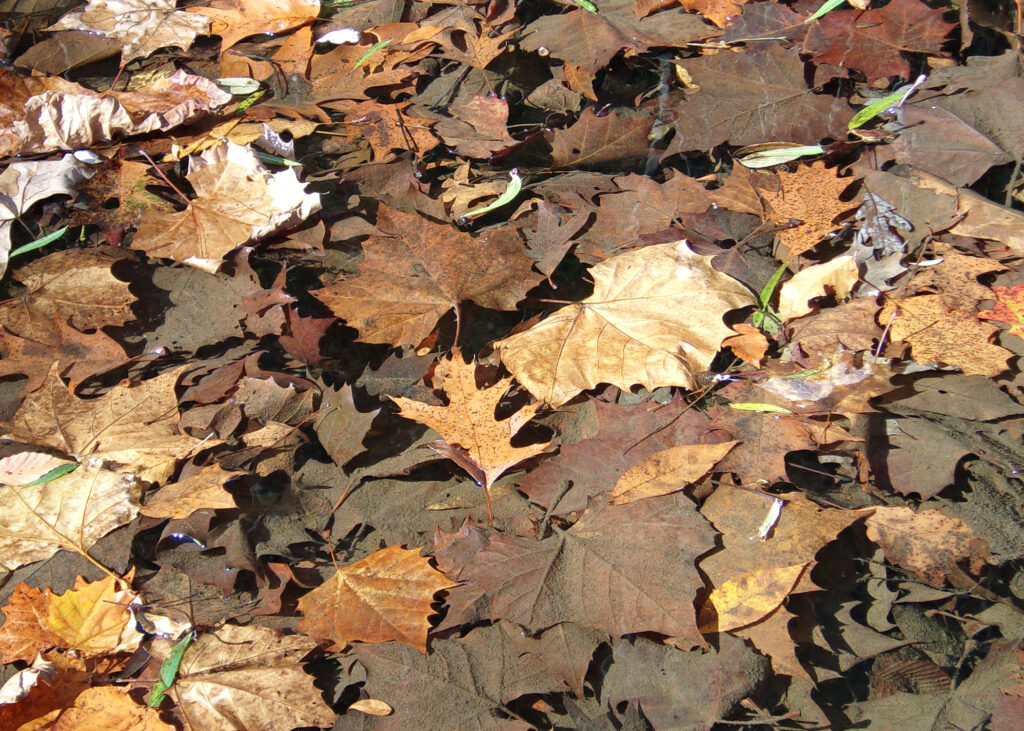
Imagine floating, on a fine autumn day,
down from the tree that birthed you,
gently floating on a breath of a breeze
and landing, feather-soft, on water
so still you can’t even see it.
~ A Joy Warrior's Journey

Imagine floating, on a fine autumn day,
down from the tree that birthed you,
gently floating on a breath of a breeze
and landing, feather-soft, on water
so still you can’t even see it.
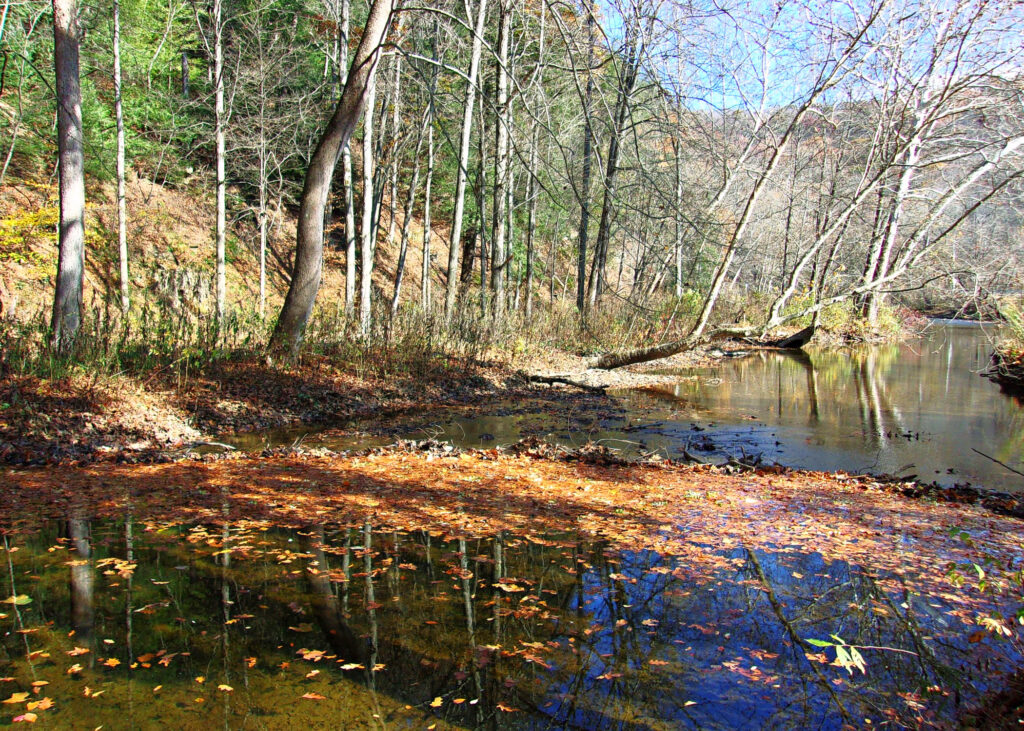
This is the place that eclipses everything else,
where only being exists, mine melded with it all,
distinct but a part of it. Me – not even thinking
how – transcribing its frequencies into color,
temperature, fragrance, taste, sound, motion,
sending back to it joy-laced wonder. Thoughts
dissolve here before they’re even formed.
The silt-covered rocks beneath the clear water
have no need of words to say what they are.
The water cannot be captured by names.
The only way to comprehend the mystery
is to drench yourself in it, and to let it
drench itself in all you have to give.
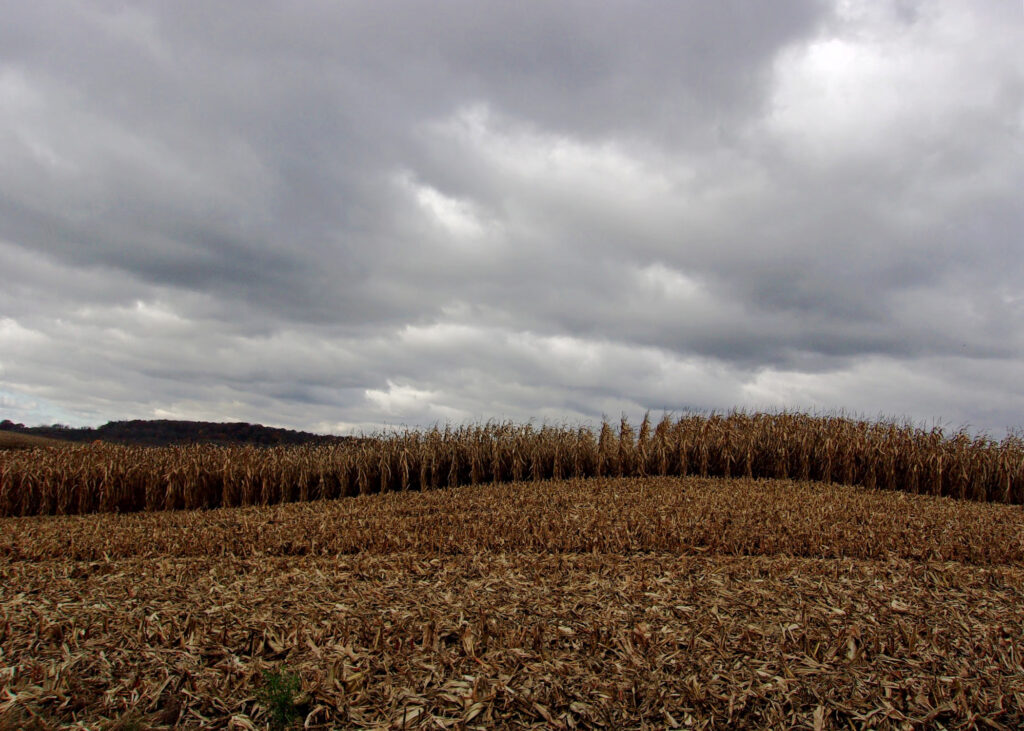
October brought the corn to its peak. Now the trick
is to get it in between rains if the field is dry enough
for the harvester and the enormous truck that hauls
it to giant bins for drying and storage. That’s for starters.
From there it goes on long journeys in many directions,
nurturing many along the way, and at the end returning
to the earth, as, I suppose, do all living things.
As of today, I see that a giant swath of the crop
has been cut and hauled. Much more remains. Soon.
The farmer studies weather screens with a furrowed brow.
“Friday,” he murmurs. “Maybe late tomorrow.”
I stop to photograph the field’s texture and curve,
the distant row of standing corn looking brave
beneath an ominous sky that threatens snow.
But Friday, maybe tomorrow afternoon, sunshine
will waltz across these hills and the mighty machines
will join in the song, and a week from now, the corn
will be gone.
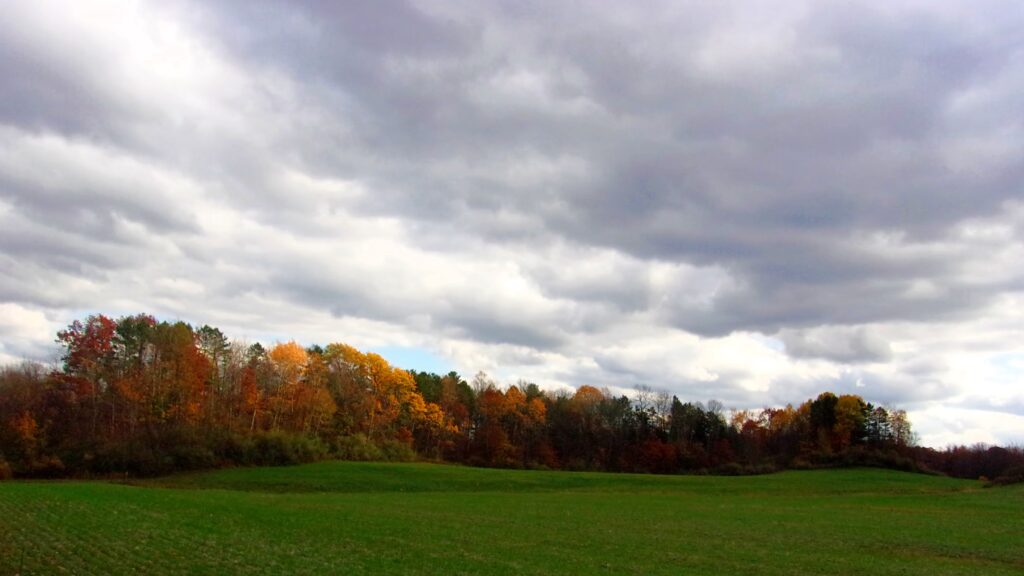
A few stands of color held on until the end.
Someone had to hold the gold in salute to her.
Fallen leaves tumbled across the leveled fields.
Someone had to dance in her honor.
Vast clouds sailed on a brisk, cold wind.
Someone had to wrap her in ermine.
She, who brought the harvest to fruition.
She, who woke us from our summer dreams
with the glory of her song. Someone
got to stand here in this field, breathing
the fragrance of her, watching as she spent
her last hours singing a final amen
as the winds and the hours swept her away.
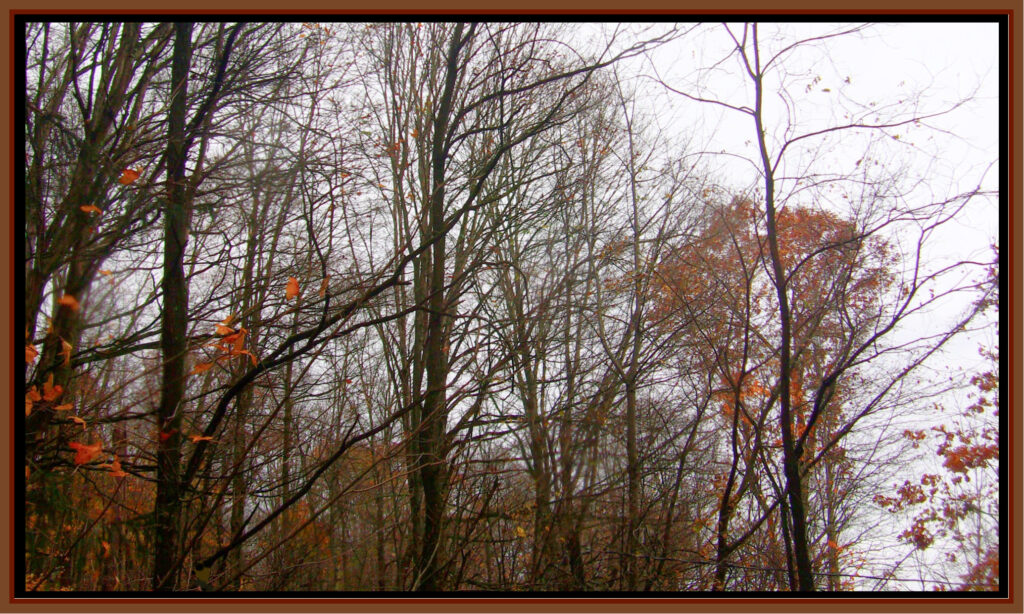
As night fell, a curtain of rain swept
through the woods, hurling the maples’ gold
to the ground, except for a token few,
the bravest. And of course the russet oaks
held on. They’ll endure nearly ‘til winter.
The green on the forest floor was gone, too,
tucked in against the sudden cold beneath
the deep quilt of fallen leaves. As I peered
at this stark new scene I thought to myself
that at least I would now be able to see
the squirrels leaping, the turkeys and deer
ambling up the hill from the field below.
And hardly had the thought written itself
across my mind when a buck appeared,
large, and sporting an impressive rack,
slowly ascending the western slope
as if he owned it. Now the serious side
of autumn has begun. Act two.
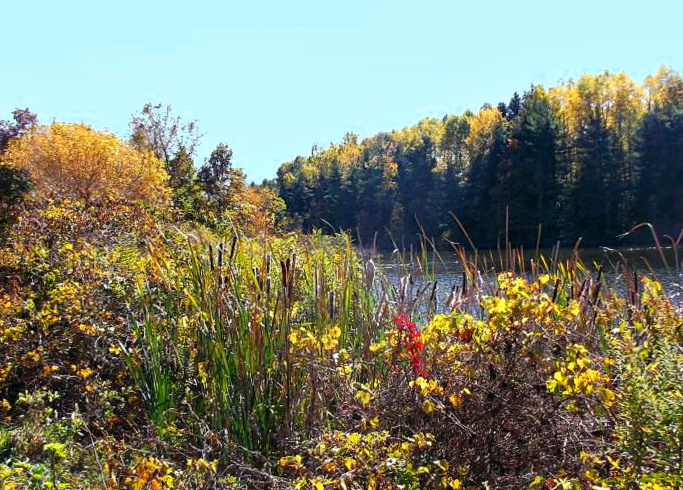
Two years ago, in mid-October, the stream
that flows from the last spillway down to the lake
was lined with a vast heap of autumn wildflowers
so artfully arranged that the sight made you stop
and stare at the textures and movement and colors
as if you were standing in a great ancient gallery
before a masterpiece that took up a whole section
of wall, only this gallery was made of earth and sky.
The next year, some no-doubt educated and informed
person with authority over this piece of county land
ordered it all mowed down, turned to grass.
I have a little card on my bulletin board that says
“Look around you. Appreciate what you see.
Nothing will be the same in a year.”
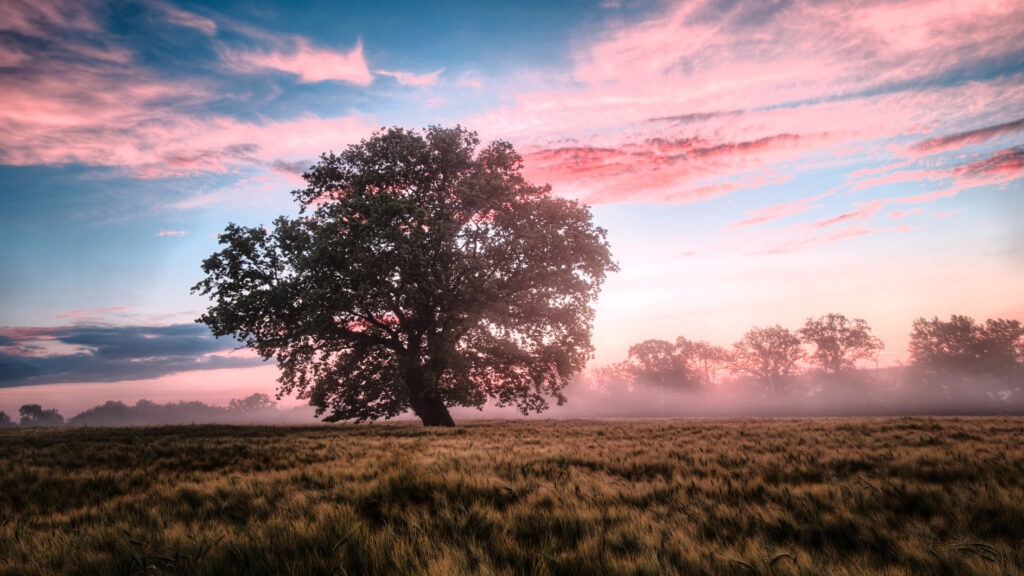
I’ve been leafing through old files again. It seems like the season for it. Today I ran across an essay I wrote on a lovely June Day way back in 2016, an age that seems to belong, somehow, to a different world. Still, we grappled then with the same kinds of fears we find ourselves facing today. Even though it’s a tad longer than my usual Sunday Letters, I thought the piece might touch you as it did me. So here it is, with love. ~Susan
I woke just before dawn yesterday morning. I’m not an early riser. The birds hadn’t even begun to chirp. Yet here I was, wide awake. I made a cup of coffee and took it out to my front porch to experience the beginning of the day. As I took my first sip, I noticed a faint ribbon of pink just above the eastern hills, gradually growing brighter. Looking directly overhead, I saw that the sky had gone from dusky gray to light blue graced by soft clouds. When I looked down again, a whole palette of color was lighting the sky—pale gold, coral, robin’s egg blue, soft lavender. And as if to acknowledge the coming of another day, the birds woke and began their morning chorus.
I let myself drink in the peace of it. The world has been such a brutal place these last few weeks, its violence and mayhem loud and sickening. Yet here I was, enveloped in birdsong and sunrise, sipping freshly brewed coffee. I felt lucky, and grateful, and kind of humbled to be so blessed.
I paused to do a few rounds of loving-kindness meditation, and as I sent wishes for well-being, peace and happiness to friends and acquaintances, to my community, to my region, to my nation, and then to all sentient beings with whom I share the globe, I realized that more of us are living unscathed by mayhem at the moment than are directly touched by it.
Most of us live our ordinary lives, attending to our daily routines and chores, relating in our usual ways with families and coworkers and friends. We share our smiles, and sometimes our tears. We share our rituals, our news, our opinions, our gossip. We play together. We squabble. We make up. All of us. All over the world. And isn’t that beautiful!
That we can go on, determined to live ordinary lives in the face of extraordinary times, is remarkable.
I came across a couple observations by American historian and professor Howard Zinn this week. He said:
“To be hopeful in bad times is not just foolishly romantic. It is based on the fact that human history is a history not only of cruelty, but also of compassion, sacrifice, courage, kindness.
What we choose to emphasize in this complex history will determine our lives. If we see only the worst, it destroys our capacity to do something. If we remember those times and places—and there are so many—where people have behaved magnificently, this gives us the energy to act, and at least the possibility of sending this spinning top of a world in a different direction. “
I get the impression that Zinn is thinking of acts of high bravery and daring when he talks about how magnificently we can behave. And indeed we can. But I think courage is more than the extraordinary act performed at great risk. I think it’s also the determination to go on living ordinary lives as well as we can even when the world seems mad. The acts of compassion, and sacrifice and kindness can be tiny ones as well, consistently performed despite it all.
Mark Twain had this to say about courage: “Courage is resistance to fear, mastery of fear – not absence of fear. Except a creature be part coward it is not a compliment to say it is brave.”
When we live our ordinary lives in the face of what seems almost omnipresent violence and rage, we are being brave. By refusing to surrender to fear, however loudly and persistently the media screams about atrocities, we tell the world it cannot take the best of us. We will behave magnificently, holding to the dignity of our ordinary lives. And sometimes pausing to recognize that despite it all, we are surrounded by extraordinary goodness and beauty, and, sometimes, bathed in moments of transcendent peace.
Wishing you a week of brave, wonderful, ordinary life.
Warmly,
Susan
Image by Hervé Lagrange from Pixabay
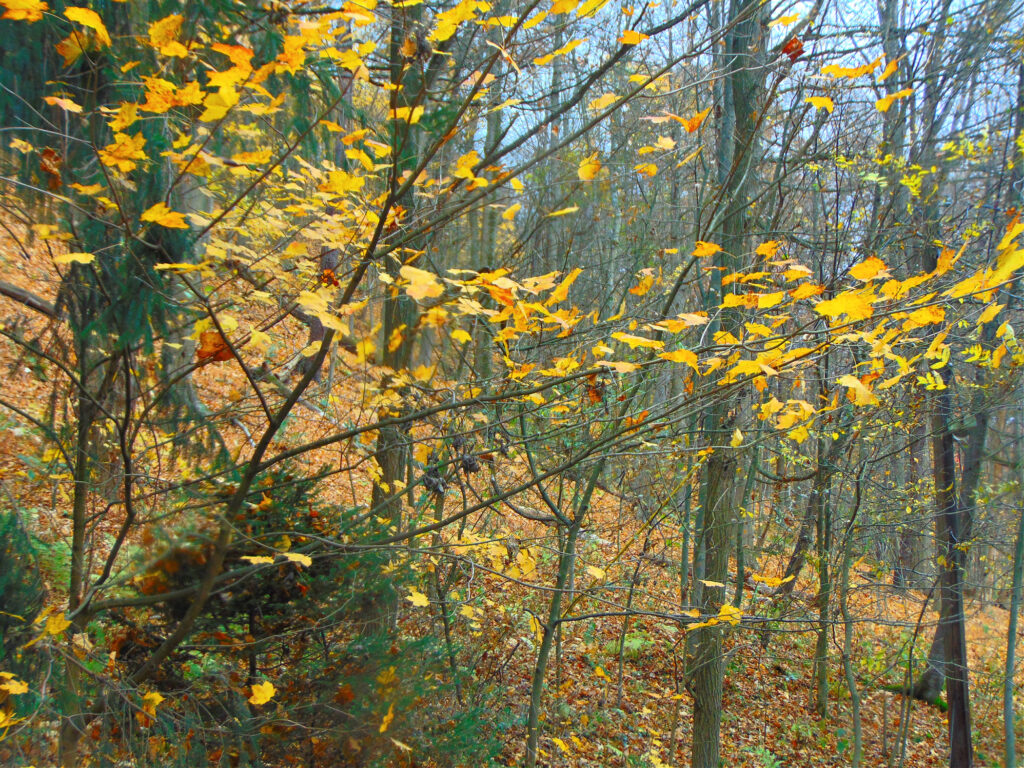
Their motion caught my eye, a thousand leaves
whirling in the wind as if a cyclone had caught them,
their ecstasy filling the air, lifting my spirit along with
their own, etching the moment into the surface
of eternity, dancing there, and me with them, forever.
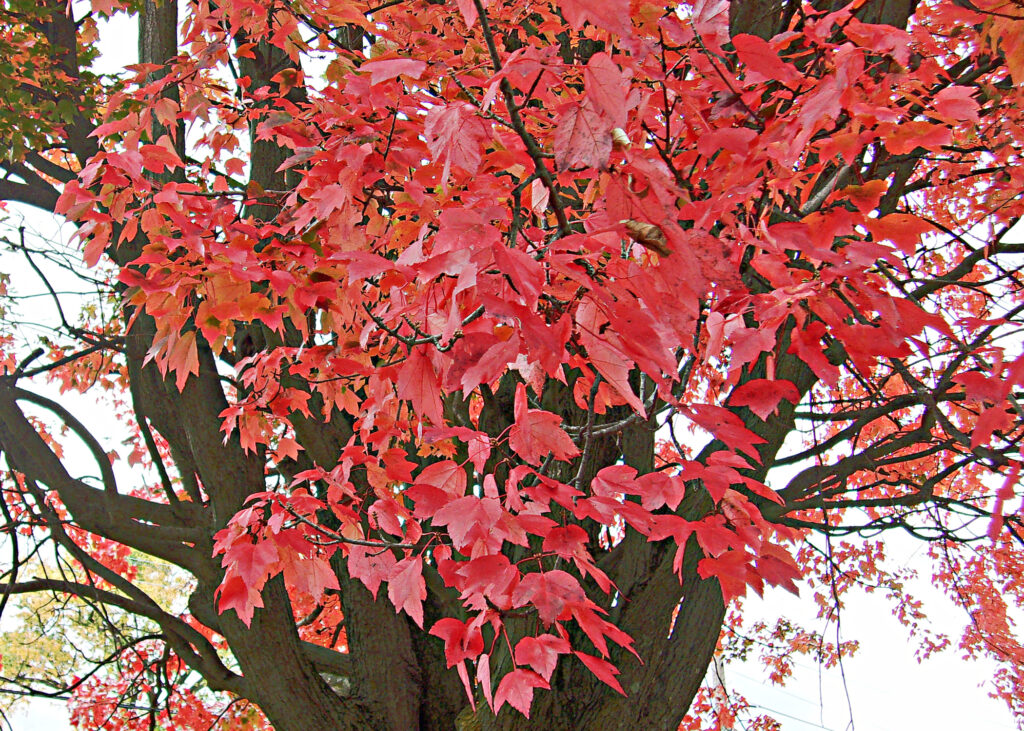
Even now, beneath skies deep with clouds
and a cold wind blowing, even now,
in the days of dwindling light, the Yes
provides reminders. The trees
may be nearly bare and the fields
stripped of vegetation, but look!
Here is a maple still holding its color,
a kiss-bright red to dispel the gloom.
Go into the night believing.
You are supported, and loved.
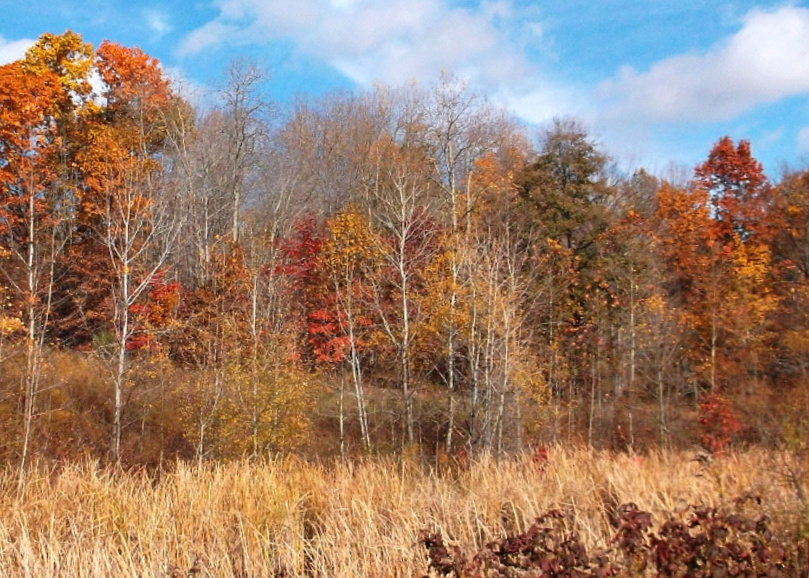
The red-winged blackbirds are gone now,
having flown like the leaves from the trees
who stand bare behind the low blue creek,
raising their white limbs to the sky
as if in celebration of their freedom.
Except for the rustling of the breeze
through the bright oaks and the occasional
call of a crow, silence reigns, a portent
of the coming winter’s quiet. But before
the earth settles into dream, she dances
one more time, in jeweled colors lifted high,
like promises of beauty to come,
as she whirls toward winter,
toward another distant spring.